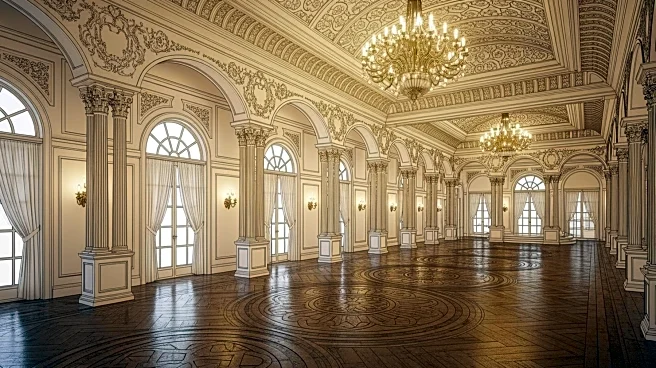What's Happening?
President Trump has commenced the construction of a new $250 million White House ballroom, sparking debate over the funding sources. The project, which began with the demolition of parts of the East Wing,
is shrouded in mystery regarding the identities of donors contributing to its financing. President Trump has pledged to personally fund significant portions of the construction, while anonymous donors are expected to contribute over $20 million. Legal experts have raised concerns that the funding model may resemble a 'pay-to-play' scheme, potentially granting donors access to the administration. A dinner for potential donors included executives from major companies such as Blackstone, OpenAI, Microsoft, and Google, with YouTube contributing $22 million as part of a legal settlement with Trump.
Why It's Important?
The construction of the ballroom raises ethical questions about the influence of wealthy donors on political processes. Critics argue that the funding model could allow corporations to gain favor with the administration, reminiscent of past controversies involving political fundraising. The ballroom, intended to host state dinners and large events, could become a venue for political fundraising, increasing the risk of perceived impropriety. The involvement of major corporations and the lack of transparency regarding donor identities highlight concerns about the intersection of money and politics in the U.S., potentially impacting public trust in government operations.
What's Next?
The White House plans to release an official list of donors, which may provide clarity on the funding sources. As construction progresses, scrutiny from legal experts and the public is likely to continue, focusing on the ethical implications of the funding model. Future administrations may face pressure to address the perceived 'pay-to-play' dynamics and ensure transparency in political fundraising. The ballroom's completion could set a precedent for how large-scale projects at the White House are funded, influencing future renovations and constructions.
Beyond the Headlines
The ballroom's construction could have long-term implications for political fundraising practices in the U.S. The ethical concerns raised may prompt discussions on campaign finance reform and the role of corporate donations in politics. Additionally, the project highlights the ongoing debate about the influence of money in political decision-making, potentially leading to increased calls for transparency and accountability in government operations.










